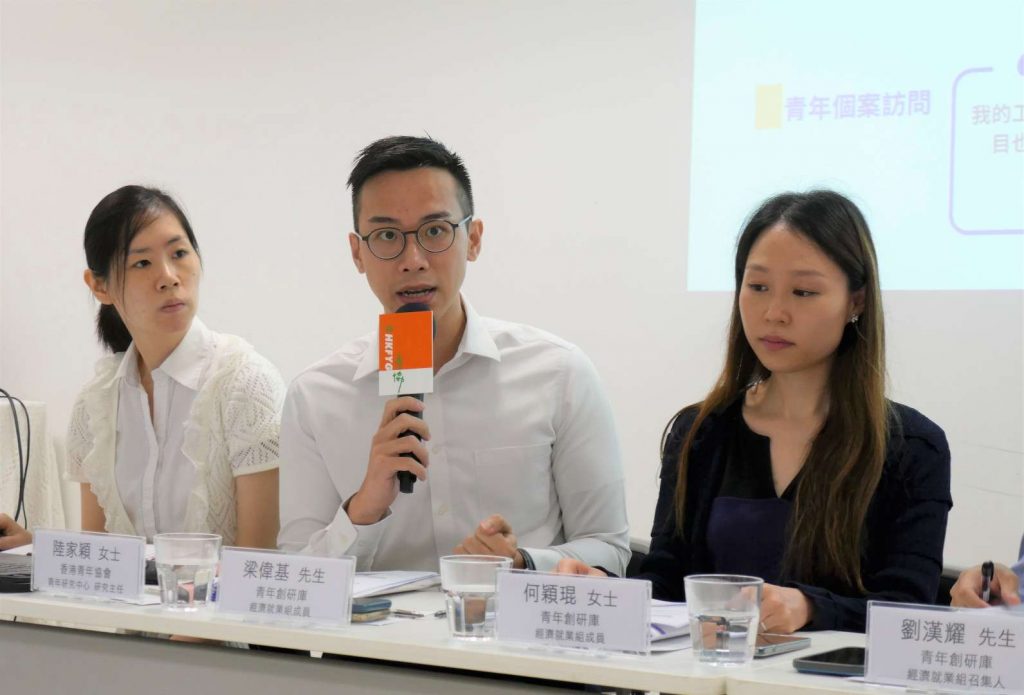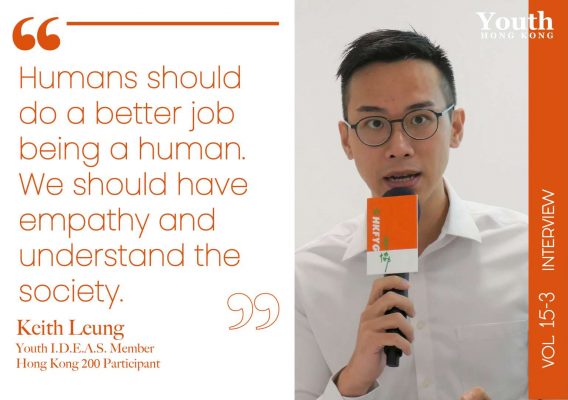//vol.15-3 Interview
Stay Connected and Embrace Humanity in Youth Services
 What would life be like if we could live forever, if we had eight arms like an octopus, or if we made a different choice 15 years ago?
What would life be like if we could live forever, if we had eight arms like an octopus, or if we made a different choice 15 years ago?
Keith Leung, a member of the Federation’s think tank, Youth I.D.E.A.S., has pondered such hypothetical questions. What if he hadn’t joined the Federation’s “Hong Kong 200” Leadership Project?
“I think without all this, I would focus more about myself, instead of having a wider perspective about what’s happening in the society. I would lose the sense of the connection with the wider society and myself.”
Back when Keith Leung was in secondary school, he had a unique opportunity to interview street sleepers and understand social issues in Sham Shui Po, a densely populated, lower-income neighbourhood in Hong Kong. This experience of trying to find real solutions to alleviate poverty and help disadvantaged groups profoundly impacted Keith, altering the trajectory of his life’s journey.
Visiting Sham Shui Po to gain insights into existing social issues was part of the Federation’s “Hong Kong 200” Leadership Project to nurture future leaders. Keith, who later became the convenor of Youth I.D.E.A.S., a local think tank established by the HKFYG in 2015, had his perspective broadened and approached social problems with a human touch.
“Before the programme I didn’t go to the area to just interfere and talk to those street sleepers,” Keith reflects. “I think this type of experience during the programme helped me to open my eyes to look at what is happening in the society.”
Leveraging the strong network provided by The HKFYG through the “Hong Kong 200” project, Keith values the chance to interact with his peers and understand the society in a more holistic manner.
In addition to these experiences, Keith says engaging in youth service projects has become his secret to staying young. In the world of young people, he remains open to new ideas, using them as opportunities to stay informed about the ever-changing world.
“It is very easy to spend the weekend just staying at home and watching Netflix and the whole weekend is gone,” Keith adds. “I think without all this understanding, I would focus more about myself, instead of having a wider perspective about what’s happening in the society. I would lose the sense of the connection with the wider society and myself.”

Discussing a recent research project on generative AI organised by Youth I.D.E.A.S., Keith delved into research and discussions concerning the latest developments in ChatGPT and its impact on young people.
While generative AI has the potential to bridge information gaps and overcome human limitations, it also presents challenges to young people and future generations as technology advances rapidly. Keith emphasises the need for technology training tailored to individuals with expertise in specific areas, such as art or finance. This approach explores how machines can expedite production and enhance human work. Following this, Keith believes that the next crucial step is to train individuals to be more human.
“We know that generative AI can do a lot of things better than humans. I think humans should do an even better job in terms of being a human, meaning that we should have empathy and understand the society,” Keith says.
He rejects the notion of using technology solely for economic gain and calls for a broader vision of improving society not only for ourselves but for the entire community.
“If we just use the technology to focus on improving the numbers, then we are like the executor of the aggregate from another machine. It will lack the human touch.”
Joining the leadership training programmes organised by the HKFYG helped him be empathetic and understanding. Compared with self-initiated activities, organisations and the government have a more structured design that includes interviews, discussions, and solutions, providing a valuable avenue for personal growth.
“I think the first thing I recommend is to participate in as many leadership programmes as possible and to experience what’s going on, what’s happening in society. This is very important and this lesson stays in my heart to make me more human,” Keith adds.
Keith’s life could have followed a conventional path — five days a week in a bank, the daily grind from 9 am to 6 pm, weekends spent chilling and watching TV — if he hadn’t joined any youth service projects back in secondary school. However, there would have been one puzzle missing from his life: the sense of being connected with other like-minded young people, as well as an impulse to care for the community.
Over the past 15 years, the HKFYG has played such a role in creating communication platforms, promoting social engagement, and helping young individuals grow in the face of social challenges.
To better empower young people amid upcoming challenges, according to Keith, youth services should be designed in a way that is “relevant” and “future-proof,” inspiring young people with an interactive and immersive learning experience.
“Youth service providers need to stay up-to-date about mega trends, including government policy for youth and for society development, new technology such as generative AI and digitalisation, as well as youth’s needs,” Keith adds. ■


